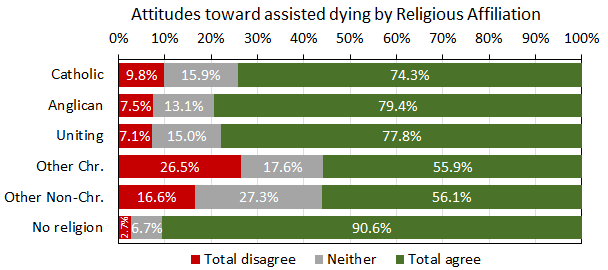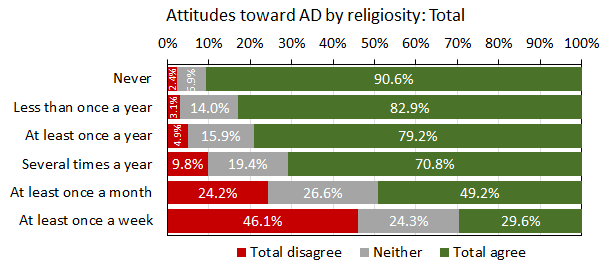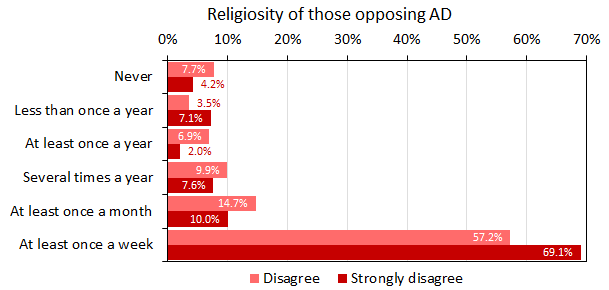Opposition to assisted dying is largely religious

A claim was recently made on ABC’s QandA that at least 70% of Catholics and Anglicans support assisted dying. The claim was challenged and a FactCheck prepared and vetted by scholars. They concluded that some but not all polls supported the statement. I show unambiguously that relevant polls do. I show further, as I have in the past, that opposition is largely associated with Australia's most religious.
Get the full, detailed report here.
Known polls
In 2007, a Newspoll survey found that 74% of Catholics and 81% of Anglicans support assisted dying. The 2016 Australian Election Study (AES), run by scholars at Australian National University, found almost identical rates: 74% of Catholics and 79% of Anglicans. Although a majority of all religious denomination groups support assisted dying, opposition is highest among minor Christian denominations (Figure 1).
A significant majority of support for assisted dying was also found across all age groups, education levels, income levels, states, and major political party affiliations and religious denominations, with support amongst Australians overall at 77%.
Casting doubt
However, another poll cited in the FactCheck found far less support: the 2011 National Church Life Survey (NCLS). It found just 28% of Catholics and 25% of Anglicans supported assisted dying.
The problem with the NCLS poll is that it didn’t take a valid sample of Australian Catholics and Anglicans. It sampled mostly or only those who frequently attend religious services.
Views vary widely by attendance frequency
Figure 2 shows the level of support amongst the Australian public, by frequency of attending religious services. While just 2.4% of those who never attend religious services oppose assisted dying, 46.1% of those attending at least once a week oppose it.
NCLS poll cannot answer the question
The NCLS results were even more negative than the AES ‘at least once a week’ results. That’s explained by the NCLS methodology. Firstly, occasional attenders were underrepresented, and non-attenders were excluded altogether. Secondly, more church employees (the most deeply committed and aligned with church policies) than others would have participated. Thirdly, responders may have felt pressured to toe the church line because the survey forms were collected by the churches themselves. And fourthly, those who disagreed with the church line would be less likely to participate.
ABC QandA question answered
So we can discount the NCLS poll because it was not suited to answer the question about all Australian Catholics and Anglicans.
On that basis, it is not only reasonable to say that “up to 70% of Catholics and Anglicans support assisted dying,” but to say that “at least 70% of Catholics and Anglicans support assisted dying.”
Religious connections of opposers
But, back to the opposition of assisted dying. AES data shows that 92% of those opposing and 94% of those strongly opposing assisted dying have a religious affiliation (self-identify with a religious denomination) or attend religious services. So, while a tiny minority of opposers had no religious affiliation nor attended religious services, almost all those opposing have a religious connection.
Frequent service attendance entrenches opposition
If we focus in on those who identify with a religious denomination and who disagree with assisted dying, we find that there’s a massive difference in opposition to assisted dying between the ‘at least once a week’ attenders and everyone else (Figure 3).
Not only are the majority of opposers weekly religious service attenders, but weekly attenders are more likely to be strongly opposed. This highlights the strong alignment with and commitment to religious teachings, which (with rare exceptions) oppose assisted dying.
If we define the most religious Australians as those who attend religious services monthly or more often and who self-identify with a religious denomination (“Regulars” in Figure 4), and who make up just 15.7% of the population, their attitudes are remarkably more opposed to assisted dying than all other Australians — by a factor of more than eleven to one.
Amongst the 84.3% of Australians who are not “Regulars”, almost all of them (85.7%) agree with assisted dying, and almost none of them (3.6%) disagree.
Demographic differences explained by religiosity
The variation in attitudes toward assisted dying by general demographics is largely explained by religiosity — defined here as ‘the frequency of attending religious services’.
For example, the increased opposition amongst older Australians is explained by their increased religiosity. The same applies to religious denomination affiliation (e.g. Catholics attend services more often than Anglicans), education, urban versus rural residence, and political party first preference.
Religiosity was the only variable that independently explained variations in opposition to assisted dying.
The double whammy — affiliation and attendance
Also informative is the comparison of those with or without a religious affiliation versus those who do and don’t attend religious services. (Australians fall into all four categories.)
Amongst those with no religious affiliation, people who do attend religious services are only slightly less likely (than those who don’t attend) to support assisted dying (-7%), and their difference in attitude is mostly to neutrality.
However, of those with a religious affiliation, people who do attend religious services are significantly less likely to support assisted dying (-27%), and the majority of their difference in attitude is opposition rather than neutrality.
Thus, those more deeply aligned with their religious denomination through service attendance are significantly more likely to oppose assisted dying.
Moderated by personal experience
The 2007 Newspoll study asked respondents if they had personal experience of someone close who was hopelessly ill and had wanted voluntary euthanasia.
Amongst those with no religious affiliation, this personal experience increased support for assisted dying by just 3.7%, because support was already very high: from 90.9% to 94.6%.
However, amongst those with a religious affiliation, personal experience increased support for assisted dying markedly by 15.2%: from 72.4% to 87.6%.
Thus, those attending religious services, yet with close, personal experience of hopeless illness with a desire for assisted dying, were significantly less likely to align with opposed religious doctrine.
The most religious are a small minority
With so much opposition amongst Australia’s most religious, why is overall support for assisted dying so high? It’s because Australia’s most religious are a small minority of the population.
Nearly half (48%) of Australians never attend religious services, two thirds (65%) attend less than once a year or never, and three quarters (75%) attend once a year or less, including never.
Those who attend religious services frequently (weekly or more often) comprise just 12% of the population, while those who attend regularly (monthly or more often which includes the weeklies) comprise 16%.
Religion in Australia has been declining for decades, and the fall is likely to continue (see Appendix A of the full report, here), meaning that support for assisted dying is likely to increase in the future.
Conclusions
I’ve previously demonstrated how all the signatories to a major anti-assisted dying advertisement were deeply connected with religion. The AES and other studies further our understanding of wider public attitudes toward assisted dying in Australia. They show that while a substantial majority of Australians support assisted dying, almost all the opposition to it is connected with religion, particularly amongst the most religious who are a small minority of the population.
Despite the religious connection of those opposed, there is ample, robust evidence that a great majority of Catholic and Anglican Australians support assisted dying, backing the claim made on national television.
Clergy opposing assisted dying are not representing the broader views of their flocks. Perhaps they may not see that as their role, and perhaps this misalignment of attitudes and beliefs is an example of why religion in Australia is declining.
However, reflecting the views of the great majority of the constituency is the role of politicians, who would do well to take note of this robust evidence of a significant majority of support for assisted dying.
Get the full, detailed report here.

 Figure 1: Attitudes toward assisted dying by major religious denominations
Figure 1: Attitudes toward assisted dying by major religious denominations Figure 2: Attitudes toward assisted dying by frequency of attending religious services
Figure 2: Attitudes toward assisted dying by frequency of attending religious services Figure 3: Frequency of attending religious services amongst those with a religious affiliation and who disagree with assisted dying
Figure 3: Frequency of attending religious services amongst those with a religious affiliation and who disagree with assisted dying Figure 4: Attitudes by religious service attendance plus denomination affiliation (“Regulars”)
Figure 4: Attitudes by religious service attendance plus denomination affiliation (“Regulars”)